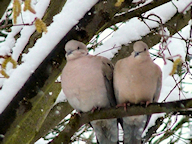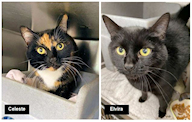





As well as founding the Ealing Animals Fair, Marion Garnett has also, since 2011, written a weekly Animal Rescue column which is published in the West London local newspaper, The Gazette. Columns published since January 2019 are now available online here.
If you would like to see any of the columns published before 2019, please contact Marion directly (see the Contacts page).
Are you glad Christmas is over? If there’s one thing Christmas does, it makes us think about where we belong and, for some, this is painful. Feeling as though we belong, whether it’s in a family group, support bubble or a place where we have roots can help us feel secure. But Christmas can make the feelings of not belonging and loneliness worse.
Of course, there are places, where no humans belong. Just before Tier 4 came into operation, I visited the London Wetland Centre and, on one gate, was the sign “Wildlife Only”. Humans clearly didn’t belong beyond that point. It’s not surprising there were some places we couldn’t go as the Centre is a haven for wildlife.
Notices such as these are a reminder that wildlife and humans shouldn’t always mix. Another example of this is when wildlife such as primates are kept as pets in people’s homes.
At present, over 85 species of primate can be legally kept as pets in the UK. The
government estimate there are currently between 1000-
For example, Leo was kept as a pet in London. This Marmoset was only two months old
when the world-
Leo was fortunate as a place was found for him at Monkey World. At present this rescue centre has over 100 primates from the pet trade on its waiting list. These include many monkeys who, as they have grown older, their owners have realised they cannot give these animals the care they need.
Many readers will be familiar with the work of Monkey World as their Director, Alison Cronin, has given presentations at the Ealing Animal Charities Fair. Alison and her team have long campaigned to stop primates being kept as pets and now there is a chance to stop this trade. Last month the government initiated a public consultation where, if we think monkeys don’t belong in people’s homes as pets, we can say so. If you want to know more and take part in the consultation, go to the Monkey World website (monkeyworld.org) and click on the link “Click here to have your say”.
Bear’s a big girl and any new owner who takes her on must be able to handle her strength
and size (55kgs). This gorgeous Akita cross Rottweiler came into the care of Dogs
Trust after her owner became unwell and could no longer care for her. Since her arrival
at the Harefield centre she has, understandably, been a little nervous as her world
was turned upside down. But she has built strong relationships with her regular canine
carers and she loves toys, especially squeaky ones. Although Bear plays happily on
her own in the kennel. she loves human interaction too. She’s also made lots of dog
friends at the centre including a Mastiff called Tux (more of Tux later). Bear’s
clever and already knows several commands. Hopefully, in her new home, she will learn
more. 
If you’re thinking of homing Bear, she will need a secure, private garden and an owner who will allow her time to settle. She could possibly live with another dog. If you’re interested, see details of how to apply at dogstrust.org.uk.
Now, back to Tux. Dogs Trust would like to thank all those who gave the centre gifts for Christmas. On Christmas Day each dog was taken to reception where they could choose for themselves what they wanted. Max chose a tennis ball, Badger picked a rope toy but Bear’s friend, Tux, chose, of course, a big fluffy bear.
After playing with it for a while, no doubt none of the dogs wanted to take their present back. Some people could learn a lesson from these dogs.
Many people got a new pet in a previous lockdown and, as rehoming centres feared, increasing numbers of these animals are already being sold online or being given to animal charities as they are no longer wanted. This has prompted the Dogs Trust slogan “A Dog is for life, not just for Christmas” to evolve into “A dog is for life, not just for lockdown”.
In order to help people decide if they are ready for dog ownership, Dogs Trust have devised a quiz. It includes questions such as “Are you ready to take a dog for a walk in all weathers?” and “Can you afford to spend money each month on dog food, insurance and canine essentials?”.
If you are ready, they have specific advice on caring for a dog during lockdown. For example, how you can give your dog the amount of physical and mental exercise it needs. See details at dogstrust.org.uk.
As we stagger through our third lockdown, many of us are missing things we normally see or do. Each of us will have our own thoughts about what we particularly miss but, at least we know that, hopefully, once the pandemic is over, much of what has disappeared, will be back.
This isn’t the case for things that have gone for ever and there’s nowhere quite like a Museum to remind us of this. Although, at present, we can’t go to the Natural History Museum in person, we can take part in what they are offering online. For example, we can cast our vote in the People’s Choice Category of the Wildlife Photographer of the Year exhibition. Photos in this category are always stunning with some showing how animals are in danger of disappearing from our planet for ever. One contender for the People’s Choice Award this year shows Sudan, the last male northern white rhino being comforted on his deathbed moments before he passed away. Another photo shows a bushfire raging in Australia leaving a trail of destruction in an area which is home to many endangered species. Fires are one of the biggest threats to this precious habitat. To view all 25 photos and vote, go to nhm.ac.uk.
Aware of disappearing wildlife, the Museum is hosting a live-
One of the authors, Robert Macfarlane, has written “We have to keep hoping, making this world a better place will be the work of many hands…We can do this; we can be good ancestors”.

One way we can be good ancestors is by playing our part in initiatives to halt the
disappearance of wildlife. For example, in order to monitor any decline in bird numbers,
on January 29-
During this pandemic, we’re all, in our own way, keeping watch -
Elvira and Celeste are also keeping watch. At present they are being cared for at
a vets but, by the time you read this, they will have moved to foster care. The veterinary
staff say that Elvira and Celeste watch them all the time – every move they make.
 They also say that, often, these two gorgeous sisters prefer cuddles to food. Elvira
and Celeste came into the care of Hounslow Animal Welfare Society (HAWS) after their
owners went into a care home. They are not used to children so need to go to an adult-
They also say that, often, these two gorgeous sisters prefer cuddles to food. Elvira
and Celeste came into the care of Hounslow Animal Welfare Society (HAWS) after their
owners went into a care home. They are not used to children so need to go to an adult-
Now, let’s get back to watching. It’s the Big Garden Birdwatch this week organised annually by the Royal Society for the Protection of Birds (RSPB). This event increases understanding of the challenges wildlife face by monitoring changing numbers of different birds. For example, it was one of the first surveys to identify the decline of song thrushes. In order to participate, all you have to do is choose any hour between January 29 and 31 and count the birds that land in your garden. If you don’t have a garden but your home overlooks a green space, you could try counting from your window. Ignore any birds that are in flight. In order to avoid double counting, just record the highest number of each bird species you see at any one time – not a running total. The RSPB have bird identification sheets to help us. You then send your results to the RSPB. For more details see rspb.org.uk.
Finally, a message for all readers hoping to watch the live concert in aid of the Urban Nature Project from the Natural History Museum in February that I mentioned last week. Because of Covid, the Museum’s plans have changed. The new arrangements are at nhm.ac.uk.
January 2021

Although the information given here is, to the best of the organiser’s knowledge and belief,
correct, the organiser reserves the right to make alterations and amendments, as necessary.
| Groups 2025 |
| Map |
| Car parking |
| Subject Index |